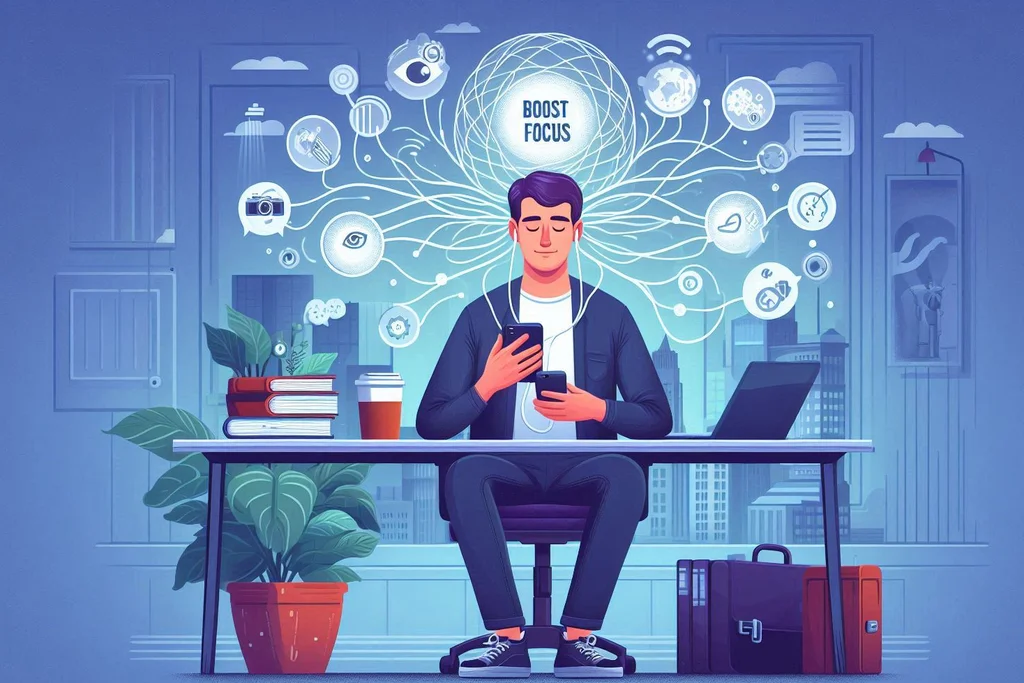Boost Focus: The Power of Disconnecting from Mobile Internet
Is constant smartphone use affecting mental well-being? Discover how a simple internet block can boost cognitive health and happiness now!

Spending extended hours each day connected to the internet through smartphones has become a widespread habit. Recent research, however, suggests that stepping back from constant online access may support notable improvements in mental well-being, overall life satisfaction, and concentration.
According to findings published in PNAS Nexus, a two-week restriction of mobile internet access on smartphones resulted in enhanced mental clarity, increased happiness, and stronger attention spans.
The research was driven by growing concerns regarding the potential cognitive and emotional impacts of frequent smartphone use. While smartphones provide convenient access to vast information, entertainment, and social interaction, the persistent availability may also contribute to diminished mental health and cognitive performance.
Surveys continue to reflect this unease. A 2022 poll revealed that nearly 60% of American smartphone users—and close to 80% among individuals under 30—acknowledged excessive reliance on their devices. Such sentiments are echoed across public discourse, with some commentators stating that smartphones are “hijacking our minds” and reshaping an entire generation’s mental landscape.
Previous investigations into smartphone use and wellness have highlighted associations between higher usage and decreased emotional well-being, increased psychological distress, and weakened focus. Yet, much of this earlier work relied on correlational data, making it difficult to determine direct effects. To address this limitation, a targeted study was developed to assess whether restricting mobile internet access could lead to measurable improvements in psychological and cognitive health. The research specifically examined the internet connectivity feature, known to be one of the smartphone’s most influential capabilities.

The Study
The research team set out to deliver experimental clarity on a pressing issue in an ever-connected digital age: could reduced internet access via smartphones offer measurable benefits to mental and emotional well-being?
“Smartphones have drastically changed our lives and behaviors over the past 15 years, but our basic human psychology remains the same,” noted study author Adrian Ward, associate professor of marketing at the University of Texas at Austin. “Our big question was, are we adapted to deal with constant connection to everything all the time? The data suggest that we are not.”
Adrian Ward
To investigate, a month-long study was carried out with 467 participants residing in the United States and Canada. Recruitment occurred through an online platform known as Prolific. Eligibility required the use of iPhones, as the application designed to block internet access was compatible only with that device type. Participants represented a variety of educational levels, ethnic backgrounds, and employment statuses, with an average age of 32.
A randomized controlled trial method was applied, widely regarded as a reliable approach for identifying cause-and-effect relationships. Participants were assigned randomly to two groups: the Intervention group and the Delayed Intervention group. At the outset, both groups maintained normal smartphone usage.
During the first two weeks, mobile internet access was disabled for the Intervention group, while the Delayed Intervention group experienced no change. In the second phase of the study, access was restored for the Intervention group and removed for the Delayed Intervention group.
This cross-over design enabled comparisons within the same individuals and between groups, providing insights into immediate effects of restricted access and the potential longevity of any benefits following re-exposure to online connectivity.
During the intervention phases, mobile internet access was restricted through the installation of an application known as Freedom. This application was configured to block all mobile internet connectivity—including both Wi-Fi and cellular data—on smartphones for a two-week period. The restriction applied exclusively to internet access, while essential functions such as text messaging and phone calls remained available. Internet use on non-mobile devices such as desktop computers and laptops was still permitted. This design enabled the isolation of mobile internet as a variable, rather than enforcing complete digital disconnection.

Compliance with the internet block was objectively monitored. The Freedom application automatically recorded the activation status of the block throughout the intervention, offering reliable adherence data. Surveys and cognitive assessments were administered at three key points: prior to the intervention (baseline), after the initial two weeks, and again at the end of the four-week study. These instruments were used to measure mental health, subjective well-being, and attention.
Subjective well-being was assessed using a standardized model encompassing three core components: presence of positive emotions, absence of negative emotions, and overall satisfaction with life. Mental health was evaluated through validated measures that captured symptoms of depression, anxiety, anger, social anxiety, and personality-related difficulties. Attention was assessed through both subjective and objective methods, including a questionnaire on attentional lapses and mind-wandering, as well as a computerized test known as the gradual onset continuous performance task (gradCPT). The gradCPT measures sustained attention by requiring responses to specific visual cues while inhibiting responses to others over an extended period.
Several additional factors were examined to better understand the mechanisms behind any observed benefits. These included levels of social connectedness, perceived self-control, patterns of time use (such as offline activities, digital communication, and media consumption), and sleep duration. Baseline traits such as Fear of Missing Out (FoMO) and symptoms of attention deficit hyperactivity disorder (ADHD) were also considered as potential influences on the effects of reduced internet access.
The Results
Findings indicated that the temporary restriction of mobile internet access led to measurable improvements in psychological functioning. During the initial two-week phase, members of the Intervention group experienced notable gains in subjective well-being and mental health. These gains included increased life satisfaction and elevated positive emotions, along with reduced symptoms of anxiety, depression, and related challenges. Similar outcomes were observed in the Delayed Intervention group when access was limited during the second half of the study period.
In terms of attention, measurable improvements were observed in both groups during their respective internet restriction phases. Enhanced sustained attention was reflected in outcomes from the objective gradCPT task. Alongside these results, participants reported fewer attentional lapses and a heightened awareness of focus when mobile internet access was limited. Notably, while gains in well-being and mental health showed some reduction after access was restored, well-being levels remained significantly above baseline. Improvements in attentional awareness, however, appeared to persist beyond the intervention period.
To better understand these changes, potential mediating factors were examined. Positive shifts in psychological well-being and attention were partially attributed to changes in daily activities during the period without mobile internet. Increased time was reported in offline pursuits such as face-to-face social interaction, physical activity, and time spent outdoors. Simultaneously, media consumption was reduced. Increases in perceived self-control, enhanced social connection, and slight improvements in sleep duration also appeared to contribute to the beneficial outcomes.
The influence of individual characteristics was also assessed. Participants reporting elevated levels of Fear of Missing Out at baseline showed more pronounced improvements in mental health and subjective well-being during the intervention. Likewise, those with higher levels of ADHD symptoms at the study’s start demonstrated greater enhancements in attentional awareness. These findings suggest that certain psychological traits may heighten sensitivity to the effects of digital disconnection, with greater gains observed in those more vulnerable to distraction or online over-engagement.

Despite the positive findings, several limitations must be acknowledged. Full compliance with the internet restriction was achieved by approximately 25% of participants under the study’s strict criteria. Nonetheless, significant improvements were recorded even with partial adherence, indicating that moderate reductions in mobile internet use may still offer measurable benefits. Another limitation involved the study’s focus on iPhone users, making it uncertain whether similar outcomes would apply to other mobile platforms.
Future investigations may expand on these insights by exploring the long-term impact of reduced mobile internet access and testing these effects across broader populations. Determining the most effective duration and method of internet restriction could support more targeted interventions. Further exploration into specific types of digital content and usage patterns, as well as the psychological pathways linking mobile internet use to mental functioning, may deepen understanding of how digital habits influence health and attention.
https://doi.org/10.1093/pnasnexus/pgaf017
Summary
A month-long randomized controlled trial was conducted to explore the effects of removing constant mobile internet access on psychological functioning. Participants had their smartphones’ internet access blocked for two weeks using an app, while still being able to make calls and send texts. The intervention led to improvements in mental health, subjective well-being, and attention, with 91% of participants showing progress in at least one of these areas. The improvements were linked to changes in how participants spent their time—engaging more in social activities, exercise, and nature. These findings provide causal evidence that limiting mobile internet access can benefit cognitive and mental health, highlighting the potential drawbacks of constant digital connectivity.
